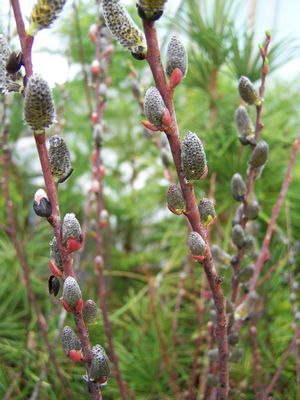Printed at http://www.quackingrassnursery.com/index.cfm/
Salix irrorata 'Rosemary Verey'
Bluestem Willow
Plant Type:
DECIDUOUS SHRUBSSalix irrorata ‘Rosemary Verey’ – Attractive semi-glossy narrow lance-shaped leaves with a silvery reverse on a handsome shrub all through the growing season emerge after small catkins adorn the stems, late winter to mid-spring. The real show begins when the foliage drops in autumn; then the Bluestem Willow shows off a whitish bloom over warm brown to olive green wood – very handsome in the winter landscape. Though this selection was made in Rosemary Verey’s garden in England this is a willow from the southwestern U.S. and should find its way into more North American gardens. Established pot grown shrub from cutting.
Please scroll down to the Genus Overview for more information.
Characteristics and Attributes for Salix irrorata 'Rosemary Verey'
Season of Interest (Flowering)
- Late Winter / Spring
Season of Interest (Foliage)
- Spring / Summer / Autumn
Interesting Bark
- Colored
Light
- Full Sun
Attributes
- Specimen
- Basketry
- Shrub Border
- Hedge
- Hedgerow
- Screen
Growth Rate in the Garden
- Moderately Fast
Soil
- Fertile
- Moist
Origins
- Garden Origin
Propagated By
- Cutting Grown
Genus Overview: Salix
Common Name: Willow
Salix. These are the willows, a large genus of woody plants. Some willows are small shrubs, others grow into huge trees and there are many bushy species which fall in between. All prefer sun planted in fertile moisture retaining soils; some are tolerant of quite wet feet. Many have quite attractive lanceolate leaves with silvery undersides that flash in summer breezes… I have often thought of these as the “poor man’s bamboo”. Some have contorted and beautifully colored bark which shines in the winter landscape. Many sport beautiful winter/spring catkins. Nearly all willows have utilitarian applications in fencing, rods, basket making. All are very prune-able; in fact, any of the larger shrubs depending upon how you desire to employ them will respond well to pruning and coppicing. When coppiced those with beautifully colored winter stems display many more of them. And as with ornamental shrub dogwoods younger stems exhibit the best, most intense winter tones. All ornamental characteristics will be presented according to species/cultivar. All of the following offerings are established pot grown shrubs from a cutting. We may prune back all larger growing selections prior to shipping so that you will not incur the extra handling charge.



